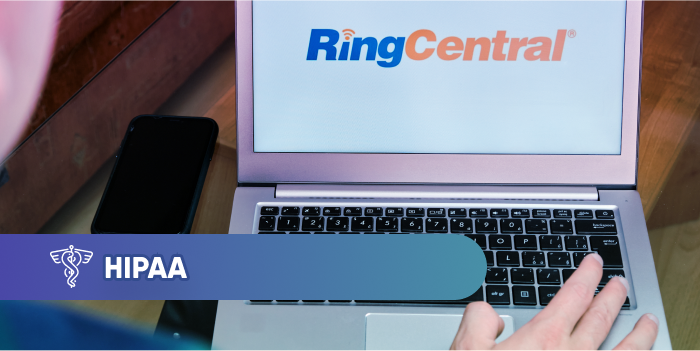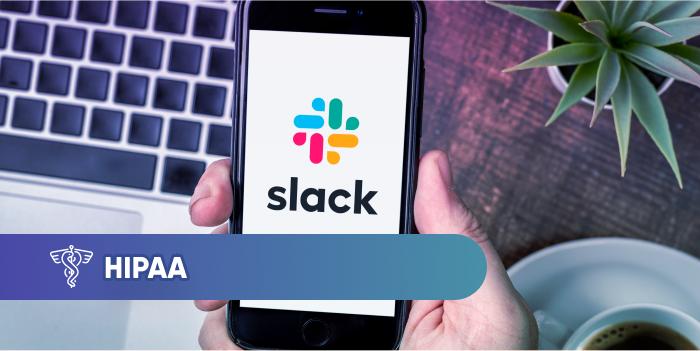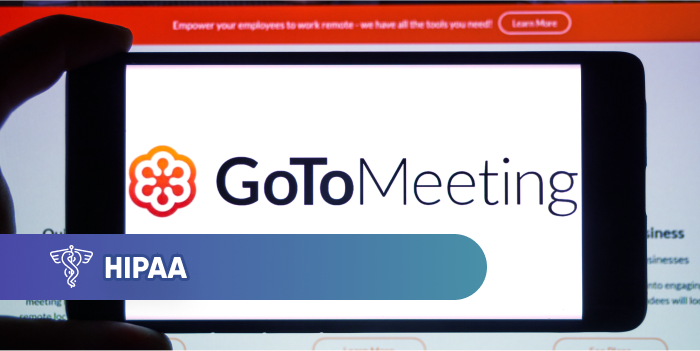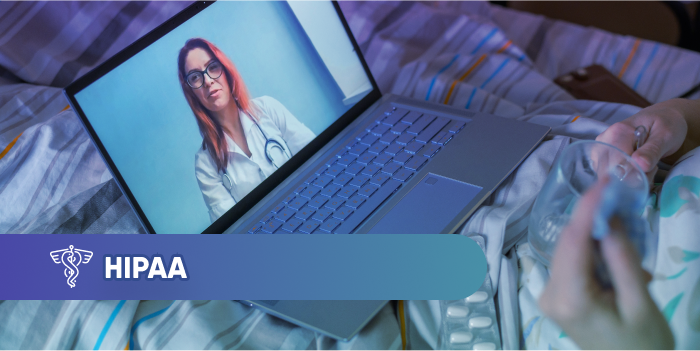Is Slack HIPAA Compliant?
The demand for remote healthcare services has increased telehealth and telemedicine uptake among medical practices, prompting them to seek out...

RingCentral offers necessary functionalities to guarantee the confidentiality, integrity, and availability of protected health information (PHI), or in an electronic form, ePHI. But, is RingCentral HIPAA compliant?
The advantages of technology allow many businesses to transition to working remotely or from home, including businesses in the healthcare industry. With the popularity of telemedicine, demand for cloud-based services increases, but healthcare providers and IT vendors must be vigilant about adhering to HIPAA regulations to avoid penalties.
Healthcare businesses must use HIPAA-compliant cloud services providers. One of these providers is RingCentral, a cloud-based system that offers phone, messaging, video, and fax solutions for businesses of all shapes and sizes.
RingCentral is an enterprise cloud communication and collaboration solution. Originally intended as a cloud-based phone system, RingCentral scaled to provide comprehensive communication solutions.
RingCentral Office includes:
Aside from the above-mentioned features, RingCentral offers individual features, such as the internal messaging app Glip, available as a separate product. Therefore, RingCentral allows your organization to choose the best package that suits your needs.
If a covered entity or BA, as defined under HIPAA, decides to purchase RingCentral services to create, receive, transmit, or maintain ePHI, they must enter into a BAA. RingCentral acts as your BA, and one of its responsibilities is to manage HIPAA obligations accordingly.
As a cloud service provider, RingCentral takes a proactive approach to guarantee the privacy and safety of health information for all communications.
RingCentral recognized the opportunity to market its communication solution to healthcare organizations. The company invests significant efforts to make sure the platform and the team messaging app are fully HIPAA compliant.
Moreover, RingCentral understands the need to protect the confidentiality and integrity of ePHI, which is why it implements seven layers of built-in security to safeguard data transfers through its services.
RingCentral’s seven layers of security measures cover the following areas:
To enable these security measures and ensure HIPAA compliance, RingCentral implements the following safeguards:
RingCentral offers all the required infrastructural safeguards, allowing healthcare providers to leverage their services in a HIPAA-compliant manner. These include:
For any type of communication — which involves sharing ePHI — to be HIPAA compliant, encryption must be in place both when the data is in transit and at rest.
RingCentral protects sensitive medical information by implementing two types of encryption:
RingCentral follows the latest security standards with its platform based on SSAE 18 and ISO 27001-audited data centers. The company uses electronic prevention systems, full-time security guards, and onsite engineering specialists to protect its data centers in a physical environment.
To support and manage its HIPAA compliance, RingCentral undergoes a third-party SOC2+ audit annually to satisfy all the HIPAA rules and guarantee the proper implementation of the necessary safeguards. You can get in touch with the company and request a copy of the latest report.
It is crucial to note that, according to RingCentral’s website, the covered entity is ultimately responsible for determining their organization’s overall compliance with HIPAA.
The most vital advantage of RingCentral is that it is fully HIPAA compliant. Healthcare providers who opt for this solution should not get into any trouble for violating HIPAA rules and regulations.
Even though RingCentral is HIPAA compliant, it does not guarantee the best solution for your practice. Any software system has its drawbacks, and RingCentral is no exception.
If you’re considering telemedicine or virtual appointments as part of your practice’s services, you may encounter quite a few problems and hurdles with RingCentral.
Present and former clients of RingCentral have left informative and in-depth reviews about the company’s services on TrustRadius, a popular review site for business technology. Some of the most current and prevalent issues with RingCentral, according to its users, are:
Additionally, there’s a reason why RingCentral doesn’t mention electronic health record (EHR) integration and doesn’t respond to customer inquiries regarding this capability — its platform doesn’t integrate with any EHRs.
When choosing a telemedicine solution, EHR integration should be one of your top priority features. Without an EHR option, you and your team must manually enter all of the information into your EHR when sharing PHI. That means you waste valuable time on tedious administrative tasks rather than spending that time treating patients.
Considering everything, it’s evident that RingCentral is a HIPAA-compliant platform, but the system also has downsides that may significantly affect the operation of your medical practice.
Telemedicine offers many benefits to healthcare providers like you. However, considering the HIPAA regulations and other technical requirements for remote healthcare, it can be challenging to adopt telemedicine.
It’s a good thing that telemedicine solutions are widely available on the market. As technology continues to evolve in an increasingly competitive marketplace, it’s essential for healthcare professionals like you to do thorough research before choosing a telemedicine solution.
RingCentral offers decent services and a HIPAA-compliant platform. However, other solutions have more reliable and capable features to help your medical practice successfully implement telemedicine.
When choosing a telemedicine solution for your practice, the following are vital to consider:
Since patients receive remote healthcare, you must consider what areas of telemedicine drive patient experience. For example, patients want to receive text messages from their physicians. Using a secure, 2-way text messaging system for appointment booking and reminders creates an efficient and effective way to communicate with patients and boost patient experience and satisfaction.
Telemedicine implementation and integration with other technologies, such as EHRs and electronic medical software (EMR) systems, may take some time. It’s crucial to confirm how long with the telemedicine vendor because some may take weeks to complete integration. You must choose a solution with a fast and dependable integration system, such as Curogram. It takes 48 hours for Curogram to integrate with any practice management system, allowing a practice to get started right away and use its existing system for scheduling, charting, and billing.
Telemedicine technology brings efficiency to a medical office, such as by integrating digital forms such as EHRs and EMRs to help streamline all health data collected and stored by the staff. Moreover, you need to choose a platform with an internal messaging solution to allow staff members to create different channels to discuss work-related topics.
When you opt for a telemedicine platform with a 2-way text messaging platform, you know what you’re getting, and you have access to every feature from the get-go. Curogram offers a free trial, so you can see exactly how its system works in practice and have the opportunity to test out the platform’s functionality before committing.
Telemedicine solutions are easy to find, but you need to choose the right and appropriate platform carefully. Being HIPAA compliant is of the utmost importance. However, you must also consider what you need to successfully implement telemedicine since not all solutions offer the same features.
Choosing the right and more reliable platform is a huge decision that can ultimately determine the success of your telehealth initiative.

The demand for remote healthcare services has increased telehealth and telemedicine uptake among medical practices, prompting them to seek out...

GoToMeeting is a web-hosted app for virtual meetings by LogMeIn. You can use it for online meetings, video conferencing, voice calling, screen...

Skype is one of the most popular communication apps out there. It allows for easy video and audio calls as well as instant messaging between...